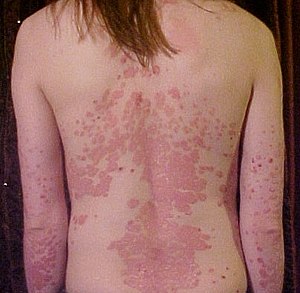
Psoriasis -
Psoriasis is a noncontagious, chronic skin condition that produces plaques of thickened, scaling skin. The dry flakes of skin scales result from the excessively rapid proliferation of skin cells. The proliferation of skin cells is triggered by inflammatory chemicals produced by specialized white blood cells called T-lymphocytes. Psoriasis commonly affects the skin of the elbows, knees, and scalp.
The spectrum of disease ranges from mild with limited involvement of small areas of skin to large, thick plaques to red inflamed skin affecting the entire body surface.
Type -
There are several different forms of psoriasis, including plaque psoriasis or psoriasis vulgaris (common plaque type), guttate psoriasis (small, drop-like spots), inverse psoriasis (in the folds like of the underarms, navel, groin, and buttocks), and pustular psoriasis (small pus-filled yellowish blisters). When the palms and the soles are involved, this is known as palmoplantar psoriasis. In erythrodermic psoriasis, the entire skin surface is involved with the disease.
Symptoms -
Red patches of skin covered with thick, silvery scales
Small scaling spots (commonly seen in children)
Dry, cracked skin that may bleed
Itching, burning or soreness
Thickened, pitted or ridged nails
Swollen and stiff joints


